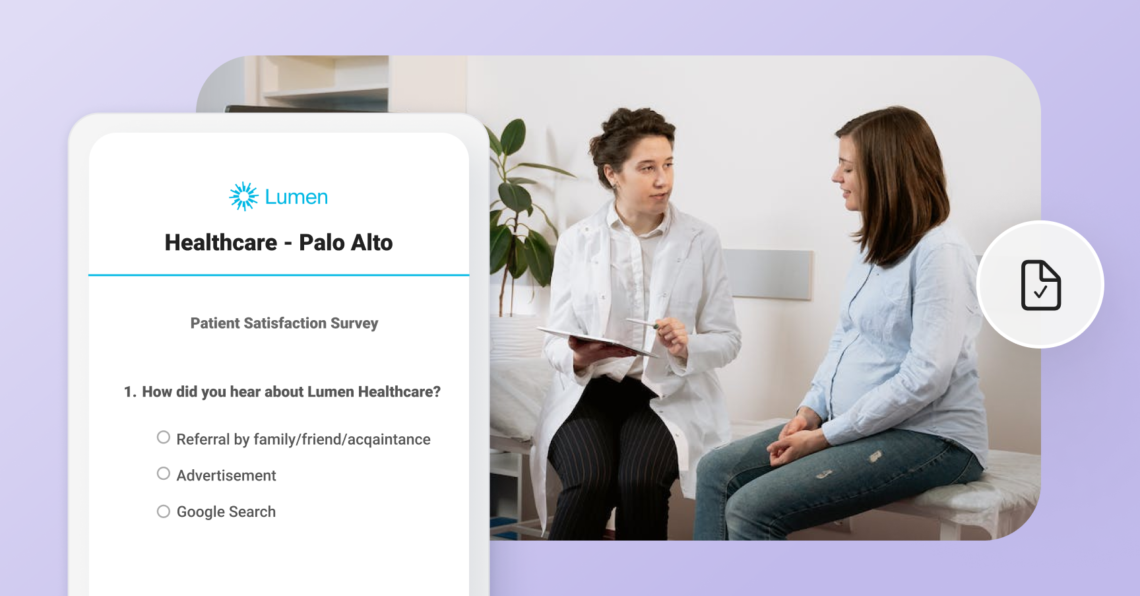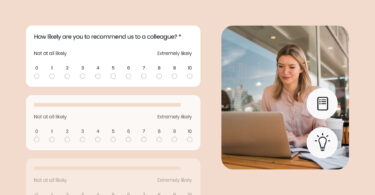Patient survey software lets you ask the questions your patients wish you would. It helps healthcare providers gain insights across every touchpoint, transforming feedback into an enhanced patient experience. From online scheduling to post-visit follow-ups, it highlights where improvements are needed most. With these insights, practices can quickly address concerns and establish lasting trust with patients.
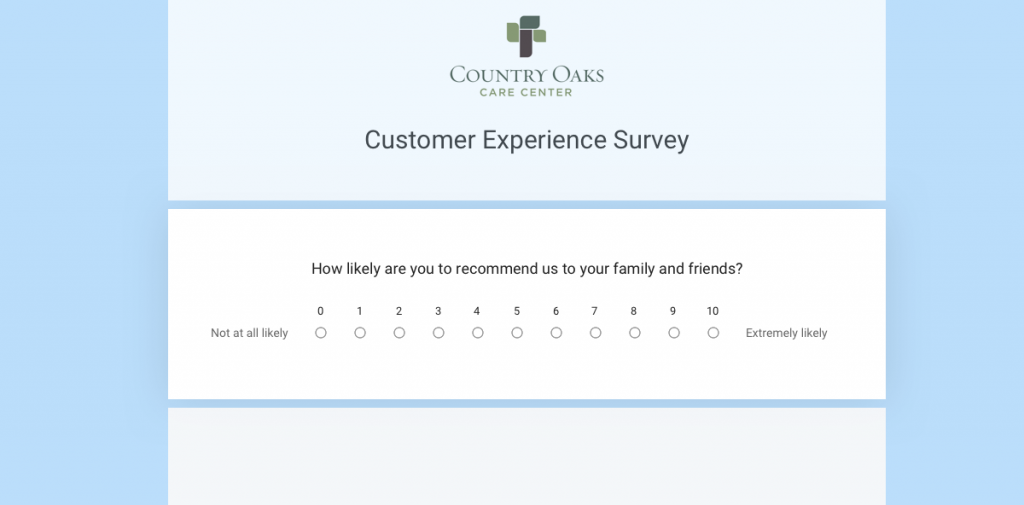
Healthcare experiences shape both reputation and outcomes, making patient feedback a vital part of modern care. From healthcare reviews to business listing management, every detail influences trust. Yet gathering that feedback isn’t always easy; low response rates and hidden insights often block progress. This is where patient survey software comes in, helping providers gain valuable insights, track patient experiences, and turn data into improved care.
In this blog, we’ll cover the eight best patient survey software in 2026, along with types, features, and benefits for healthcare professionals focused on building stronger patient relationships.
Patient survey software: A dynamic tool for patient feedback
Imagine a powerful tool that allows you to quickly gather in-depth feedback across all touchpoints of your patients’ healthcare journey. Imagine understanding their experience, identifying improvement areas, and making data-driven decisions that directly impact patient satisfaction and loyalty. This is the transformative power of patient survey software.
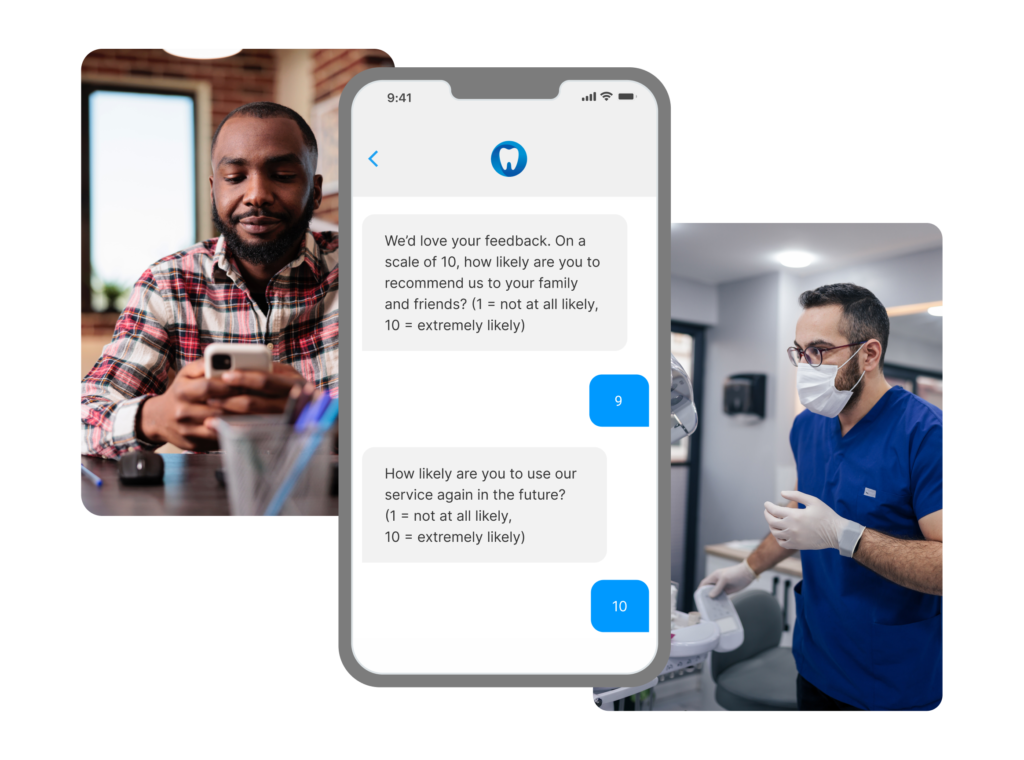
Let's unlock the power of listening and see how patient survey software can transform how you interact with your patients.
Table of contents
- Patient survey software: A dynamic tool for patient feedback
- Best patient survey software tools in 2026
- Types of patient survey software: Tailoring your approach
- Choosing your perfect match: features to consider in patient survey software
- High impact use cases: how patient survey software transforms healthcare practices
- Use case deep dive: Unveiling mental health needs and promoting wellbeing
- Keeping patient data secure: the importance of HIPAA compliance
- Frequently Asked Questions about patient survey software
- The power of listening starts now, how Birdeye can help
Best patient survey software tools in 2026
Choosing the right patient survey software can redefine how healthcare providers collect patient feedback, measure satisfaction surveys, and improve patient care. Below are tools that help you create and operationalize patient surveys across multiple channels and multiple systems.
1. Birdeye – All-in-one patient survey software and experience platform
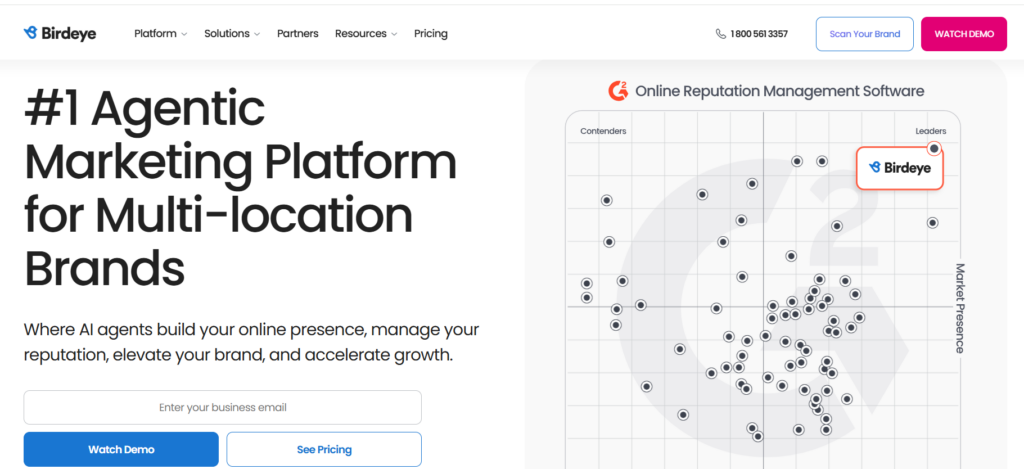
The best patient survey software in 2026 does more than collect feedback. It turns patient responses into action across reviews, messaging, listings, and AI-driven discovery. Birdeye delivers this through a single enterprise platform trusted by brands globally.
Birdeye, an enterprise-grade software for patient experience. It unifies surveys, online reviews, and reputation management in one place. It goes beyond survey software. It’s a comprehensive patient experience tool designed for healthcare organizations that want to improve patient relationships, capture real-time patient feedback, and integrate seamlessly with electronic health record systems
Pros:
- The platform provides AI-powered insights that analyze survey data and highlight patterns in patient behavior.
- It enables automated surveys that can be triggered across multiple channels, including SMS, email, web, and QR codes.
- The software is HIPAA-compliant, ensuring that sensitive patient data is always protected and secure.
- Teams receive instant alerts, allowing staff to respond to negative feedback and reinforce positive experiences quickly.
- Birdeye offers 3000+ deep integrations with Salesforce, Zapier, and major EHR/CRM systems to significantly reduce administrative burdens.
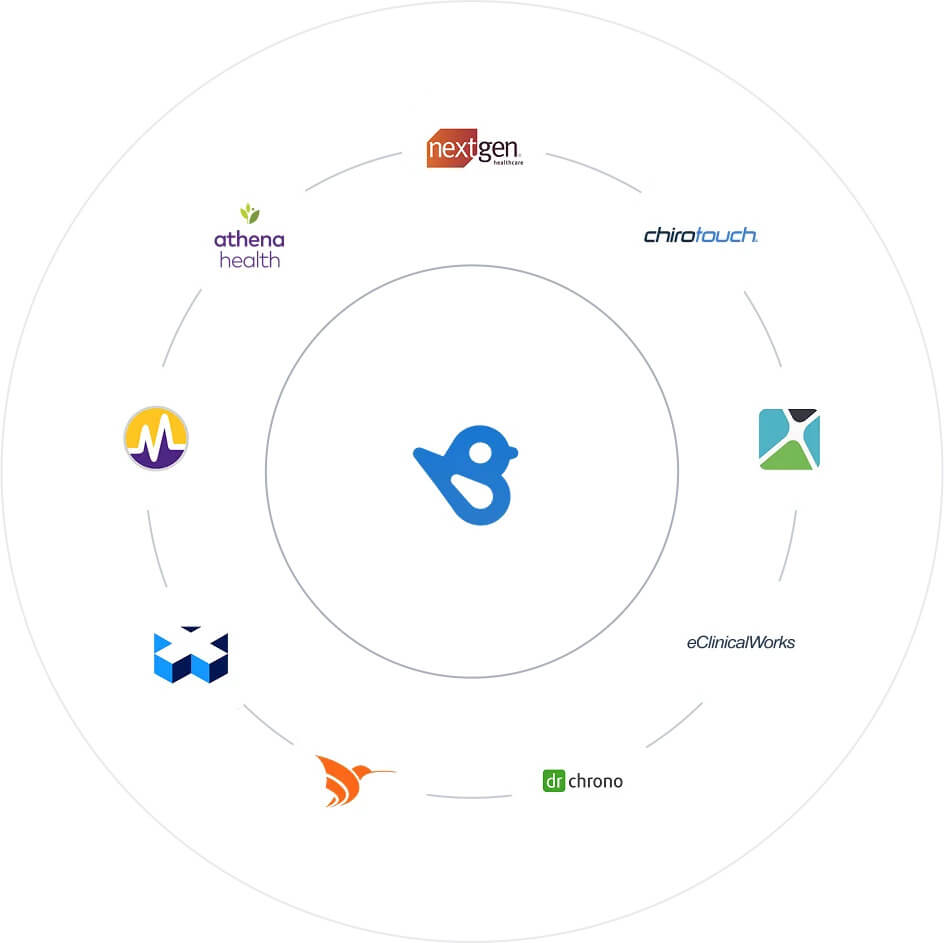
- Users can design customizable surveys tailored to specific service lines or conditions.
- The company provides transparent custom pricing, making it suitable for both large hospitals and smaller practices.
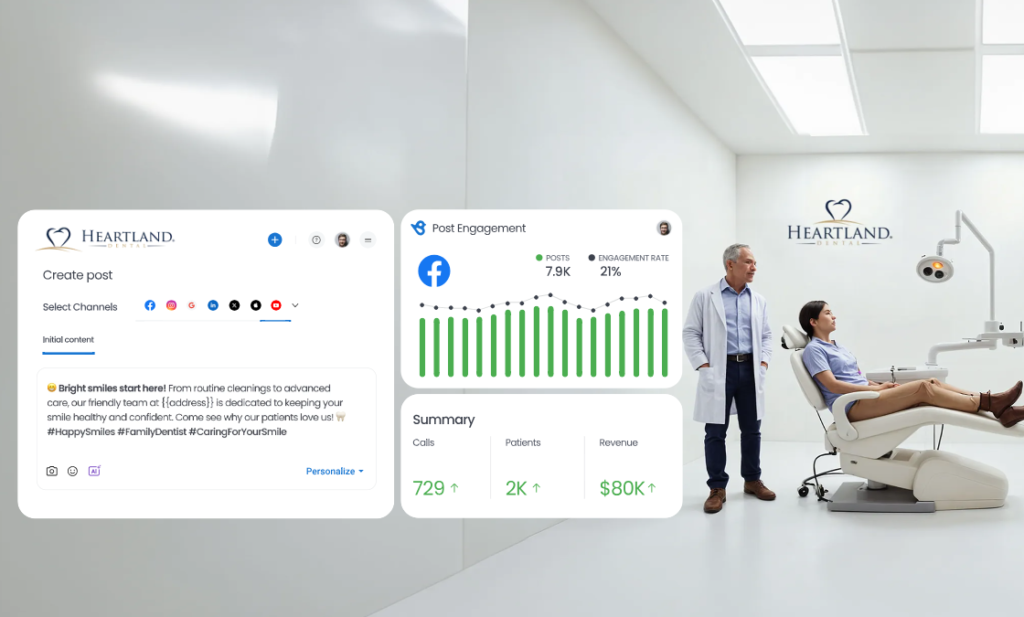
Cons:
- With real-time review collection from major platforms and integrations with EMR systems, Birdeye gives healthcare providers a complete view of patient feedback. Occasional sync delays may occur due to third-party systems, but Birdeye’s centralized dashboard ensures businesses can still monitor and act on healthcare reviews without missing opportunities.
Birdeye AI agents that act on patient feedback
Birdeye uses Agentic AI to move beyond passive surveys and reports. Its AI agents take action across the patient journey in real time.
- Review Generation Agent sends review requests at the right moment through the right channel.
- Review Response Agent drafts compliant, on-brand replies using sentiment, urgency, and images.
- Listings Optimization Agent audits profiles, fixes gaps, and applies updates across Google, Apple, Yelp, and more.
- Birdeye Search AI shows how AI engines and AI Overviews describe your brand, track sentiment and citations, and highlight actions that improve AI visibility.
- Social Publishing Agent plans and publishes localized, on-brand content across locations.
- Social Engagement Agent responds to comments and routes sensitive interactions to the right owner.
- Template Agent creates brand-approved survey, message, and survey campaign templates in seconds.
- Contact Segmentation Agent builds live patient groups for targeted follow-ups.
- Reporting Agent explains performance changes clearly and ties feedback to outcomes.
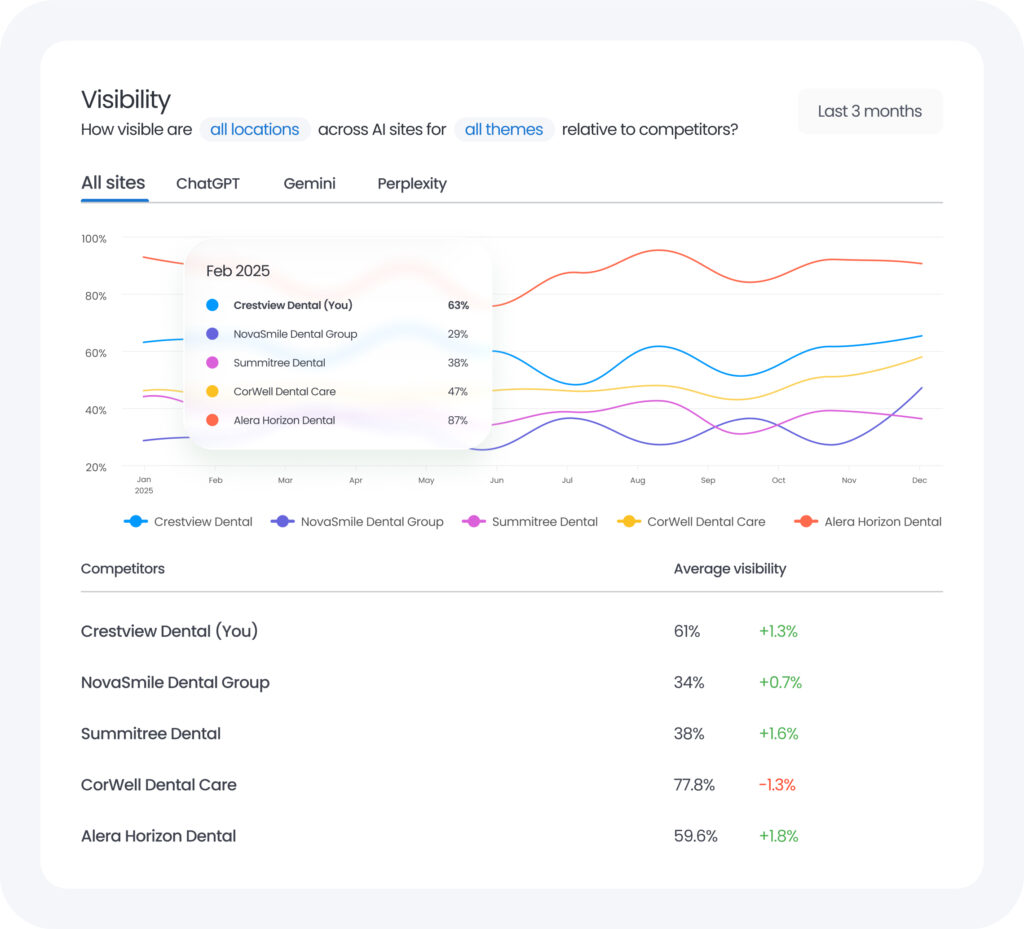
Awards and market recognition
Birdeye’s Agentic AI and enterprise-scale execution continue to earn strong industry recognition.
- Rated 4.7/5 on G2 (3,697 reviews) and 4.7/5 on Capterra (701 reviews).
- Recognized as a Leader in categories including Online Reputation Management, Local SEO, Live Chat, and SMS Marketing across Enterprise, Mid-Market, and Small Business segments.
- Ranked #4 on the Best Artificial Intelligence Software list, reflecting continued AI innovation.
- G2 Data Solutions “Market Movers” recognition for AI Agents for Business Ops.
- Diamond Pinnacle Marketing & Communications Award for AI-driven marketing innovation.
- Recognition from the Globee Business Awards.
- Recognition from the 2024 Merit Awards for Marketing and Communications.
- Honors across additional categories such as Best Customer Service Products and Highest Satisfaction Products, reinforcing ease of adoption and real-world value.
What Birdeye customers say:
Dustin Moore of Lighthouse Life Solutions explains how Birdeye removes manual effort:
“Birdeye’s big benefit for me is the combination of Salesforce and Zapier integrations. When someone agrees to leave us a review, I just check a box in Salesforce, and everything happens behind the scenes—adding them to the right campaign and sending review requests.”
Brandy Calef from Andover Auto Body adds:
“If you are looking for a company with competitive pricing, friendly onboarding, and a user-friendly platform, this is definitely the company. They walk you through every process of setting up your review process.”
Together, these stories show how Birdeye helps both healthcare sector leaders and consumer-facing businesses run patient satisfaction surveys without the hassle.
2. SurveyMonkey – Competitive survey software
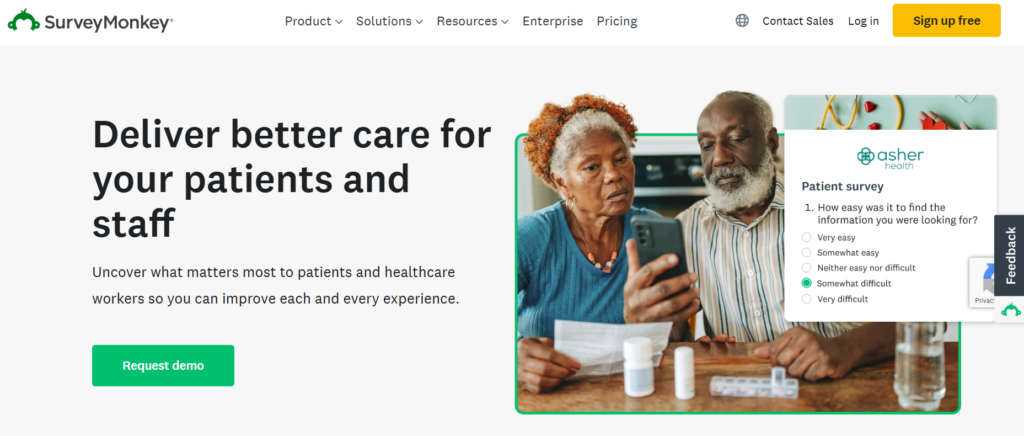
SurveyMonkey is one of the most recognizable names in the survey software space. While it isn’t built specifically for the healthcare experience, many healthcare professionals use it to run online surveys and satisfaction surveys.
Pros:
- Large template library, including healthcare-oriented options.
- Easy to get started with for quick feedback collection.
- Widely adopted across industries, making it easy for consumers and patients to recognize the interface.
Cons:
- HIPAA compliance requires an enterprise-level plan, which can be expensive.
- Limited integrations with EHR systems; data often lives outside clinical workflows.
- Reporting is broad, not designed for nuanced patient experience data or healthcare staff action planning.
SurveyMonkey is great for general online surveys, but healthcare providers needing real-time patient feedback and instant alerts will find it lacks depth compared to Birdeye.
3. Salesforce – CRM backbone with survey triggers
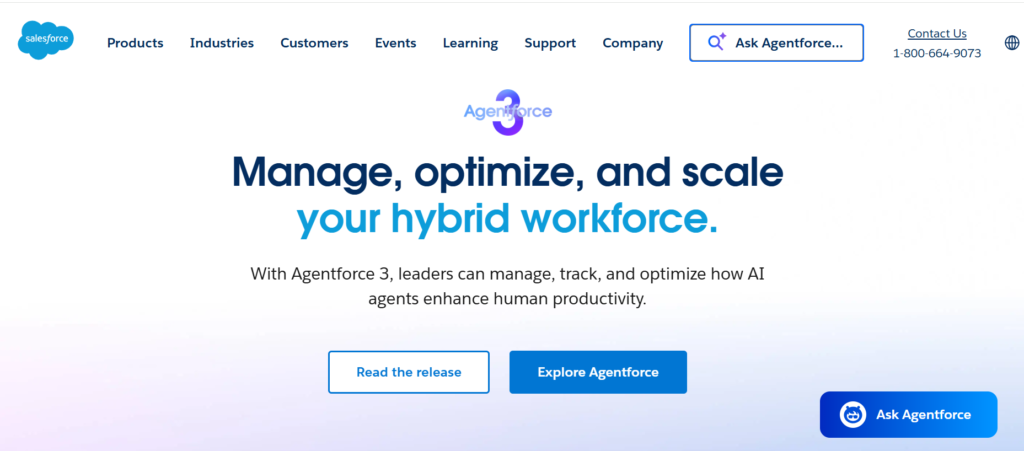
Salesforce is not survey software on its own, butit acts as a powerful backbone for managing patient data. With automation, it can trigger automated surveys through connectors like Birdeye.
Pros:
- Centralized systems for managing patients, providers, and doctors in one place.
- Strong automation capabilities to deliver surveys based on lifecycle events.
- Deep customization for complex healthcare organizations.
Cons:
- Requires third-party survey integrations for meaningful patient experience surveys.
- Can add complexity and licensing costs.
An excellent CRM that, when combined with Birdeye, becomes a seamless feedback collection engine.
4. Zonka Feedback – Patient survey software
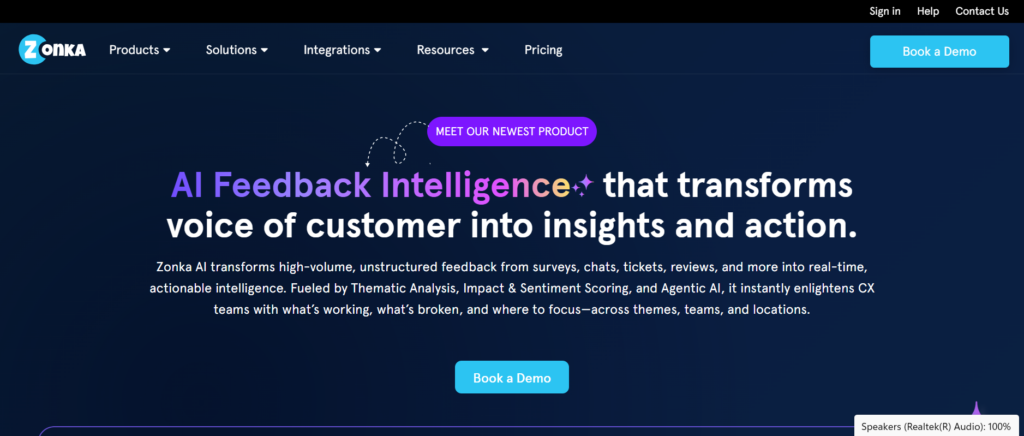
Zonka Feedback is an AI-powered Customer Feedback & Intelligence Platform built to help healthcare providers capture real-time patient experience across every touchpoint. It supports omnichannel patient surveys through email, SMS, WhatsApp, tablets, kiosks, and in-facility QR codes, making it easy to collect feedback after appointments, discharges, lab visits, or telehealth interactions. Healthcare teams also receive AI-driven insights, such as sentiment analysis, theme detection, and urgency detection, to understand patient concerns more quickly and take immediate action.
Pros:
- HIPAA-compliant survey collection across multiple channels with offline kiosk support for hospitals and clinics.
- Automated alerts and workflows help staff respond quickly to low scores or negative feedback during the patient journey.
- AI Feedback Intelligence provides deep analysis on patient comments, highlighting key themes and problem areas for operational improvement.
Cons:
- Advanced AI features and automation capabilities may require higher-tier plans.
- Requires setup time to map surveys, touchpoints, and workflows across departments for large healthcare networks.
- Kiosk and multi-device management may need onboarding assistance for organizations with many physical locations.
Zonka Feedback is ideal for healthcare organizations that want continuous, real-time patient experience monitoring, automated follow-ups, and actionable insights, especially when fast service recovery and compliance-ready workflows are essential.
5. Zapier – Automation connector
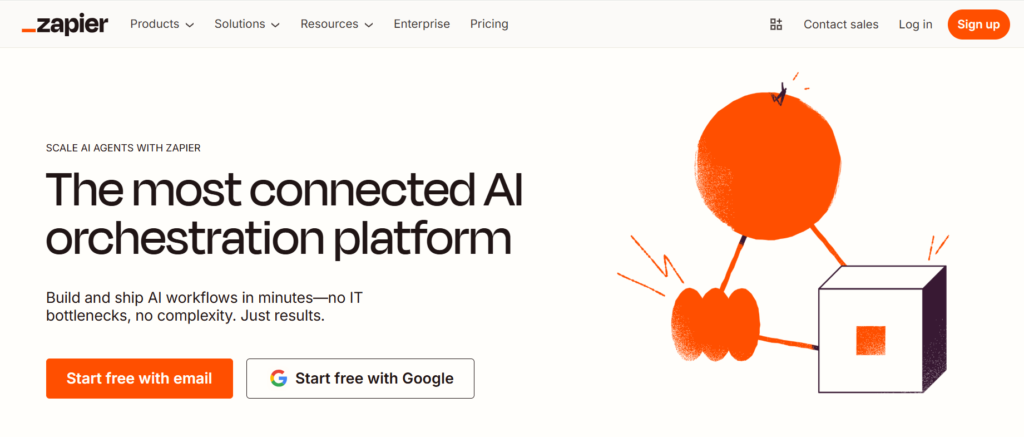
Zapier connects multiple systems without requiring coding skills, ensuring survey data flows smoothly between tools. For healthcare staff who want to reduce administrative burdens, this is a valuable connector.
Pros:
- Automates workflows between survey tools, CRMs, and communication systems.
- Reduces manual work and helps streamline the process.
- Works with thousands of apps, giving flexibility.
Cons:
- Still needs a strong patient survey platform like Birdeye to be useful.
- Some healthcare organizations may face data security concerns if misconfigured.
Zapier is a helpful automation layer, especially when paired with HIPAA-compliant survey software.
6. Twilio – Communication rails
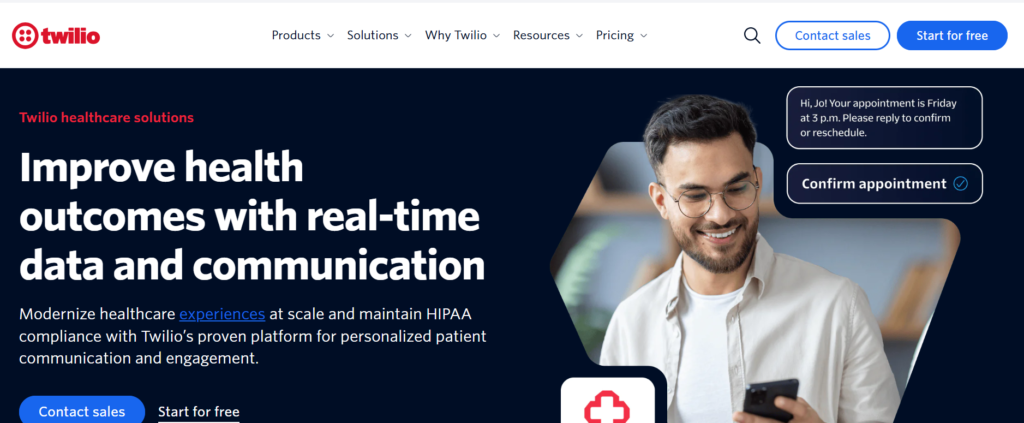
Twilio provides the infrastructure for SMS, voice, and messaging, crucial for patient engagement and feedback collection.
Pros:
- Ensures survey delivery via SMS and voice.
- Scales well for healthcare providers handling high volumes.
- Enables instant alerts for time-sensitive patient care updates.
Cons:
- Requires technical setup and isn’t a standalone survey tool.
- Needs integration with survey platforms to manage survey data.
Twilio is a strong communication backbone, but it is not built for satisfaction surveys or patient journey mapping.
7. Qualtrics – Experience management platform
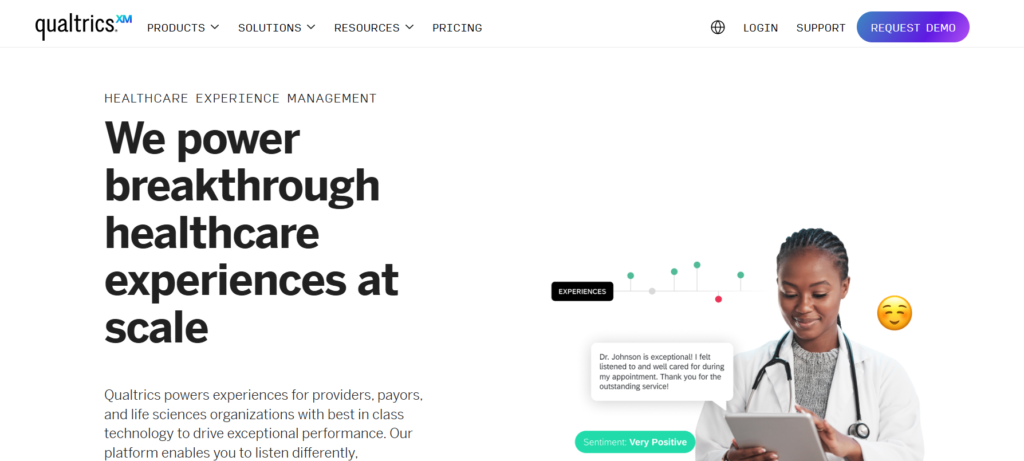
Qualtrics is a well-known experience management tool that can be applied in healthcare to capture patient feedback and run satisfaction surveys. While it offers advanced analytics, its primary strength lies in large-scale research and enterprise deployments rather than day-to-day patient engagement.
Pros:
- Provides robust analytics and reporting capabilities for uncovering patterns in survey responses.
- Offers flexibility with customizable surveys to suit different healthcare service lines.
- Supports integration with some EHR systems and CRMs to centralize patient data.
Cons:
- Often considered expensive for small and mid-sized healthcare practices.
- The platform’s complexity can create a steep learning curve for staff adoption.
- Not purpose-built for healthcare, so it lacks the specialized features of patient survey software like Birdeye.
Qualtrics is powerful for large-scale healthcare research projects, but for practical, day-to-day patient experience surveys and actionable insights, it works best when complemented by specialized tools such as Birdeye.
8. Google Business Profile – Review destination
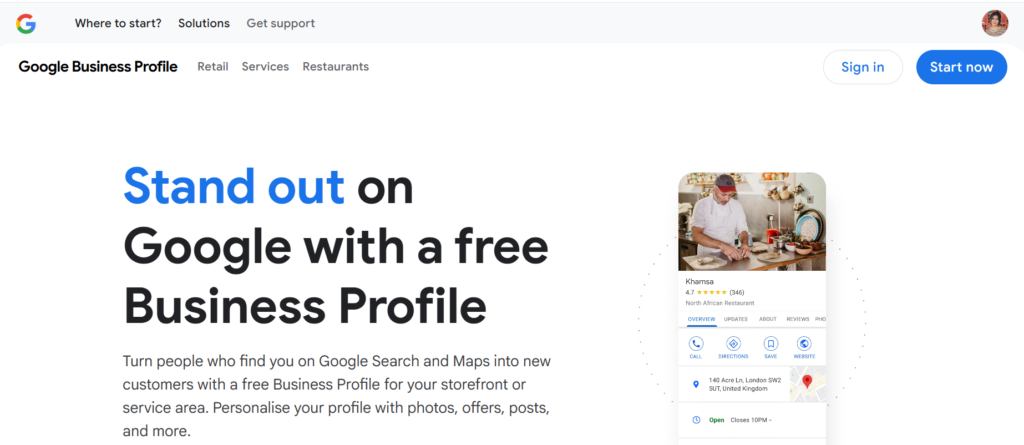
Google remains the go-to platform for online ratings and reviews. While Google Business Profile is not a survey tool itself, it is critical for converting patient feedback into public trust.
Pros:
- Visibility: Most patients search Google before visiting a practice or hospital.
- Strengthens reputation management by showcasing positive feedback.
- Free to use.
Cons:
- Limited to public online reviews, not confidential patient satisfaction surveys.
- Doesn’t allow detailed survey data capture.
Google Business Profile is crucial for reputation management, but it works best when survey responses from Birdeye flow directly into online reputation proof.
Most tools on this list solve part of the puzzle. SurveyMonkey helps run basic surveys, Salesforce manages patient data, Twilio powers communication, and EHR systems provide context. But only Birdeye combines survey software, patient experience tools, and reputation management into one platform built for the healthcare sector.
Types of patient survey software: Tailoring your approach
Patient survey software comes in many forms, giving healthcare providers complete control over how they gather insights and improve the patient care experience. Here are the key reasons to use different types:
- General patient satisfaction surveys: Capture overall patient experience across touchpoints like online scheduling, wait times, and provider communication. Pulling feedback from multiple sources helps identify areas for improvement throughout the patient journey.
- Specific condition surveys: Target patients with chronic illnesses or mental health needs to tailor treatment plans. These surveys uncover challenges and enable providers to address issues with more personalized care.
- Employee engagement surveys: A motivated staff directly improves patient care experience. These surveys measure staff satisfaction and help refine communication and training strategies.
- Post-encounter surveys: Delivered immediately after visits or procedures, these provide actionable insights into bedside manner, clarity of explanations, and wait times. They allow providers to resolve concerns quickly and enhance trust.
From broad satisfaction measures to condition-specific feedback, the right management software ensures every survey strengthens patient relationships and drives better care outcomes.
By understanding the different types of healthcare surveys available and how they can be applied, you can choose the software that best meets your unique needs and helps you gather the most valuable patient feedback.
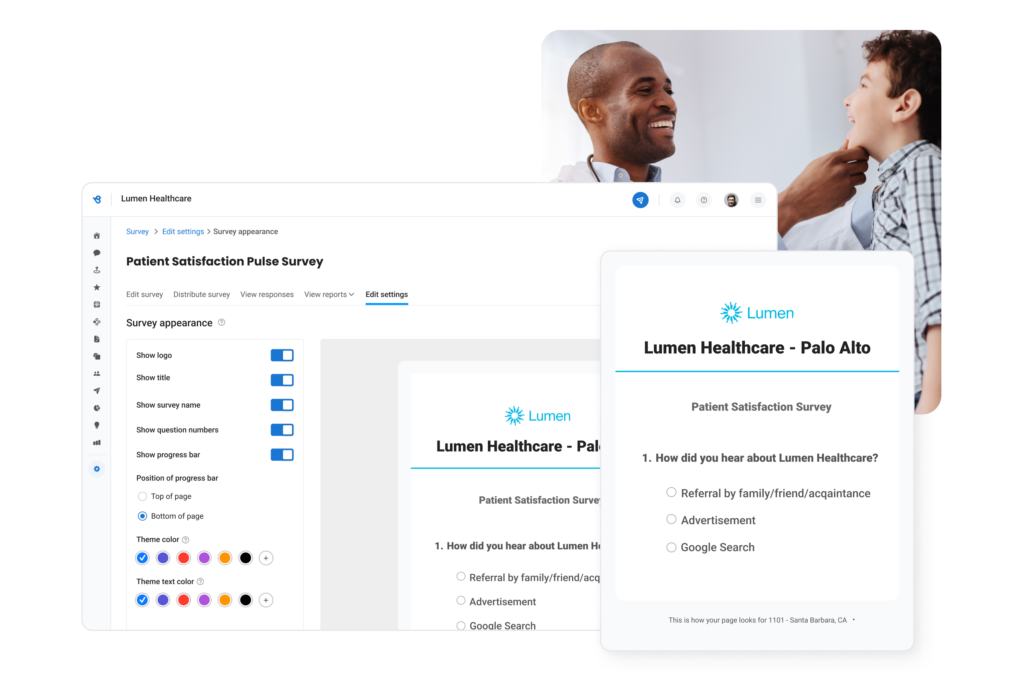
Choosing your perfect match: features to consider in patient survey software
Selecting the right patient survey software or patient survey tool is vital for improving care and collecting accurate feedback. Whether you need healthcare survey software, hospital survey software, or a broader patient feedback software, here are the essentials to look for:
- Ease of use: A patient survey platform should offer intuitive builders, templates, and quick deployment across delivery channels like email, SMS, web, or QR codes.
- Automatic triggering: The best patient experience survey software automates survey delivery at the right touchpoints, ensuring timely and consistent feedback.
- Question types: Look for flexibility; multiple choice, rating scales, and open-ended questions help capture both quick inputs and detailed patient narratives.
- Reporting & analytics: Strong dashboards and data visualization in patient satisfaction survey software turn raw responses into actionable insights.
- AI power: Modern healthcare survey tools with AI help providers uncover trends and improve patient experiences faster.
- Security & compliance: Choose a HIPAA-compliant survey software that protects patient privacy and meets regulatory standards.
- Integration: Seamless connections with EHR or practice management systems simplify data flow.
- Customer support: Reliable support, tutorials, and technical help ensure smooth adoption.
By carefully evaluating these features and additional considerations, you can choose patient survey software that empowers you to gather valuable feedback, improve patient care, and ultimately achieve your broader healthcare practice goals.
Patient survey software
see the Birdeye impact
Birdeye’s all in one survey solutions can help you understand the healthcare experience like never before. Watch our free demo to see how.
High impact use cases: how patient survey software transforms healthcare practices
Patient survey software is a powerful tool with real-world applications that can greatly impact the quality of patient care. Here are a few examples:
- Improving Patient Satisfaction with Clinic Wait Times: Patient survey software can help you gather feedback on wait times and identify peak hours. With this intel and strong survey reporting capabilities, it can implement a text notification system to keep patients updated and offer online check-in options, leading to a noticeable decrease in patient frustration and improved overall satisfaction.
- Optimizing Post-Surgery Rehabilitation Programs: Using patient survey software, you can conduct targeted surveys to assess pain management, physical therapy progress, and overall satisfaction with a post-operative care plan. The feedback will then reveal areas for improvement in pain medication regimens and communication with physical therapists, leading to a smoother recovery journey for future patients.
- Enhancing Patient Engagement in Chronic Disease Management: Patient survey software can help you conduct regular surveys to gauge patients’ disease knowledge, self-management practices, and challenges. This allows your practice to provide targeted educational resources, address specific patient concerns, and offer personalized support programs. This improved engagement then can lead to overall improved patient health outcomes.
- Addressing Communication Gaps Between Doctors and Patients: By utilizing post-encounter surveys, you can gather feedback on the clarity of explanations, and both address patient concerns and overall satisfaction with the interaction. The results can reveal areas of improvement, allowing the physician to build stronger patient relationships through active listening and ensuring a clear understanding of patient needs.
These are just a few examples of how healthcare providers can use patient survey software to enhance the quality of patient care. Each of these can enhance your healthcare reputation and ensure that your patients trust your practice.
By actively listening to patient feedback and using data-driven insights to make informed decisions, healthcare professionals can create a more patient-centered environment, improve clinical outcomes, and ultimately build a thriving practice.
Use case deep dive: Unveiling mental health needs and promoting wellbeing
While patient survey software excels at gathering feedback on physical healthcare, its potential extends far beyond that. Mental health, a crucial aspect of overall well-being, can benefit significantly from the insights gleaned from well-designed surveys delivered by top-rated healthcare survey software.

Why are patient surveys important for mental health?
Mental health issues often remain clouded in stigma, leading individuals to shy away from seeking help. Surveys provide a safe and confidential space for individuals to express their concerns and experiences related to mental health. Here’s how surveys help you provide to better mental health outcomes:
- Destigmatization: By normalizing open conversations about mental health through surveys, healthcare professionals can create a more supportive environment where individuals feel comfortable seeking help.
- Early Detection: Surveys can identify early signs of potential mental health issues such as anxiety, depression, or stress. This allows for early intervention and treatment, leading to better long-term outcomes.
- Personalized Care: Survey data provides valuable insights into an individual’s mental health needs, preferences, and challenges. This allows healthcare professionals to tailor treatment plans and support strategies for better effectiveness.
- Treatment Monitoring: Regular surveys can monitor the effectiveness of treatment plans for mental health conditions. This allows for adjustments and course corrections, ensuring patients receive the most beneficial interventions.
Surveying for wellbeing: beyond mental health
The truth is, overall wellbeing encompasses multiple dimensions, including physical health, mental health, social connections, and financial security.
Patient survey software can assess various aspects of well-being, allowing healthcare professionals to identify potential areas of concern and offer holistic support.
Here are some examples:
- Lifestyle Surveys can gather information about sleep habits, physical activity levels, and dietary choices. This data can guide interventions to promote healthy habits and improve overall well-being.
- Social Connection: Questions about social interactions, loneliness, and support systems can highlight potential deficits. This allows healthcare professionals to connect patients with resources or support groups, fostering a sense of belonging and connection.
- Financial Stress: Financial concerns can significantly impact mental and physical health. Surveys can assess financial stress levels and identify potential needs for budgeting assistance or financial planning resources.
Keeping patient data secure: the importance of HIPAA compliance
Protecting patient privacy is paramount in the healthcare industry. When gathering patient feedback through surveys, choosing software that adheres to HIPAA (Health Insurance Portability and Accountability Act) regulations is crucial. HIPAA safeguards sensitive patient health information (PHI) and ensures secure storage and transmission.
Choosing a HIPAA-compliant patient survey software solution guarantees the confidentiality and security of your patient's data. This builds trust and fosters a positive patient experience.
Here at Birdeye, for example, we understand the importance of patient privacy. Birdeye is entirely HIPAA compliant, giving you peace of mind knowing your patients’ information is always protected. With Birdeye, you can gather valuable feedback while ensuring the highest level of data security.
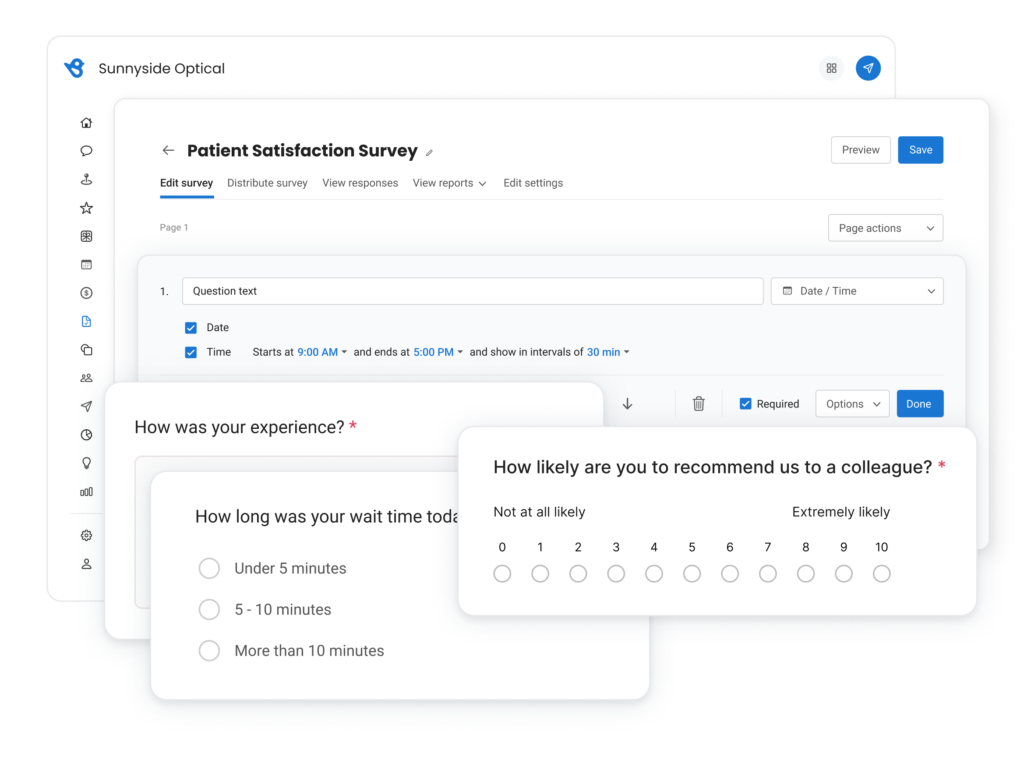
Frequently Asked Questions about patient survey software
Keep patient surveys short & sweet. Space them out and deliver with various methods (text, QR code). Explain why their feedback matters to improve their care.
To ensure you’re HIPPA compliant, be sure to choose software that is explicitly compliant. This should include built-in security measures like encrypted data, limited access, and anonymous use of data for analysis.
Sometimes. The capabilities of each tool should be considered carefully when making a decision. Choose a tool (like Birdeye) that is built with integration in mind.
Yes! Telehealth is a great opportunity to use surveys to understand how patients understand instructions provided during remote sessions. Additionally, they are already on a device that can be used to answer survey questions.
It depends. Be sure to check that the software in question is HIPPA compliant and uses encrypted data storage that protects patient data appropriately.
Patient survey software is a digital patient survey platform that enables healthcare providers to collect, analyze, and act on patient feedback in real time. These healthcare survey tools help measure patient satisfaction, identify service gaps, and improve the quality of care. Modern patient survey tools often integrate with EHRs and communication channels to ensure seamless feedback collection.
By using patient experience survey software, healthcare organizations can identify friction points across appointments, billing, and follow-ups. Insights from a patient feedback software system help providers personalize care, reduce wait times, and improve communication, leading to a smoother journey. The result is stronger trust, higher retention, and better overall outcomes.
Yes. Leading HIPAA-compliant survey software is designed to protect sensitive health data with encryption and role-based access. These patient satisfaction survey software platforms meet strict compliance standards, ensuring both regulatory adherence and patient trust. Providers can safely gather insights without risking data privacy.
GenAI-powered patient survey platforms use natural language processing and sentiment analysis to interpret open-text responses at scale. With LLMs orchestrated by AI agents, these systems identify recurring themes, predict patient concerns, and recommend next best actions. This transforms a traditional healthcare survey tool into a proactive patient survey tool that drives real-time improvements in care.
Yes. Patient survey software doesn’t just improve care quality; it also surfaces insights into staff performance, workflow efficiency, and communication gaps. Feedback captured through a patient survey platform highlights training opportunities, helping boost morale and engagement among staff. A well-deployed patient survey tool can therefore uplift both patient and staff experience.
For multi-location providers, a centralized patient satisfaction survey software consolidates feedback across clinics, hospitals, or practices. These patient survey tools allow comparison by location, service line, or provider, enabling leaders to pinpoint strengths and address weaknesses at scale. With AI-driven insights from a single patient survey platform, organizations ensure consistent experiences and higher patient satisfaction across every site.
The power of listening starts now, how Birdeye can help
In today’s competitive healthcare landscape, prioritizing patient feedback is no longer an option – it’s the key to success. Patient survey software empowers you to truly listen to your patients, understand their experiences, and translate their insights into actionable improvements. With Birdeye’s powerful survey capabilities in place, you can:
- Trigger survey requests to right customer at the right time without lifting a finger
- Use AI-driven analysis to understand feedback
- Build stronger patient relationships and foster trust
- Make data-driven decisions to find ways to improve customer experiences.
Patient survey software is your gateway to a more patient-centered approach to healthcare. Are you ready to unlock the power of listening and transform your practice? Check out Birdeye and schedule a demo today.

Originally published
